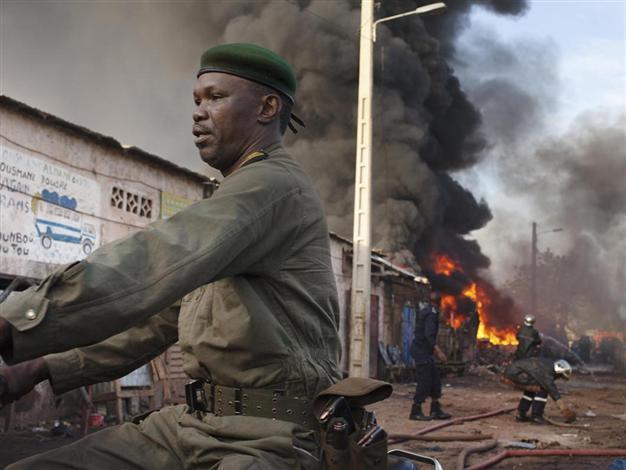French jets pound Mali as top Islamist reported killed
BAMAKO - Agence France-Presse

REUTERS photo/Joe Penny
French Mirage fighter jets on Sunday pounded Mali for a third straight day and a top Islamist leader was reported killed as African troops headed to the west African country.
"There were (air strikes) last night, there are now and there will be today and tomorrow," Defence Minister Jean-Yves Le Drian said in televised remarks.
"Our intervention is ongoing and we will continue in order to make them (Islamist fighters) retreat and allow Malian and African forces to go forward and re-establish the territorial integrity of the country," Le Drian said.
The first troops promised by African nations were expected in Mali on Sunday to join the campaign.
Burkina Faso, Niger and Senegal on Saturday each pledged 500 troops for an African-led intervention force.
Also Sunday a security source said a lieutenant of Ansar Dine chief Iyad Ag Ghaly was killed in fighting to recapture the central town of Konna from the rebels.
"The Islamist fighters suffered a real setback with the death of Abdel 'Kojak' Krim," the source said.
On Saturday French troops arrived in the capital Bamako, flying in from bases in Ivory Coast and Chad, a Malian officer told AFP. He refused to give details of their numbers or their mission.
Colonel Paul Geze, the French mission's commander, told Mali's ORTM television he hoped their mission would succeed "as quickly as possible, in the best conditions possible".
ORTM said the French contingent would be at full strength by Monday. It has been deployed in the capital to protect the 6,000-strong expatriate community.
Both France and Mali on Saturday hailed the success of their joint operation to push back an advance by the Islamists who control the north of the country.
Since taking power in the north last year, the Islamists have destroyed centuries-old Muslim mausoleums they see as heretical and imposed an extreme form of Islamic law including floggings, amputations and sometimes executions.
"Our foes have suffered heavy losses," French President Francois Hollande said, stressing that the French intervention had "only one goal, which is the fight against terrorism".
A statement late Saturday from Mali's interim president Dioncounda Traore said 11 of their soldiers had died and some 60 had been wounded in the fighting.
"They fell on the field of honour at Konna," it said.
French Defence Minister Jean-Yves Le Drian said French Mirage fighters had carried out a second day of air strikes Saturday to stop columns of Islamist fighters from driving south.
A French pilot carrying out air raids had been killed, he added. But the Islamists reportedly suffered heavy losses.
A Malian officer in the central town of Mopti, near the front line, said dozens, possibly as many as a hundred Islamists had been killed in Konna. Residents there described the bodies of men wearing Arab clothing and turbans.
Malian troops recaptured Konna Friday, just a day after it had fallen to the insurgents who had been threatening to continue their advance southward.
Human Rights Watch, citing reports from residents, said at least 10 civilians including three children had died in Konna. Children forced by the Islamists to fight in their ranks had been wounded and possibly killed in the fighting, said HRW's Corinne Dufka.
The Islamists had conscripted the child soldiers in Mali's northeast region of Gao and captured others from neighbouring Niger, she added, calling for their immediate release.
As Western nations praised the French initiative, Britain offered technical support, though no troops on the ground.
Meanwhile French President Hollande said he had ordered tighter security at home following the intervention in Mali, a former French colony.
France "has to take all necessary precautions" in the face of a terrorist threat including increased surveillance of public buildings and transport, he said.
The Islamists seized northern Mali, a territory the size of France, in the wake of last year's March 22 coup which ousted democratically elected president Amadou Toumani Toure.
There were fears the north could become a haven for extremist groups. Some observers feared their recent advance south threatened the whole country.
